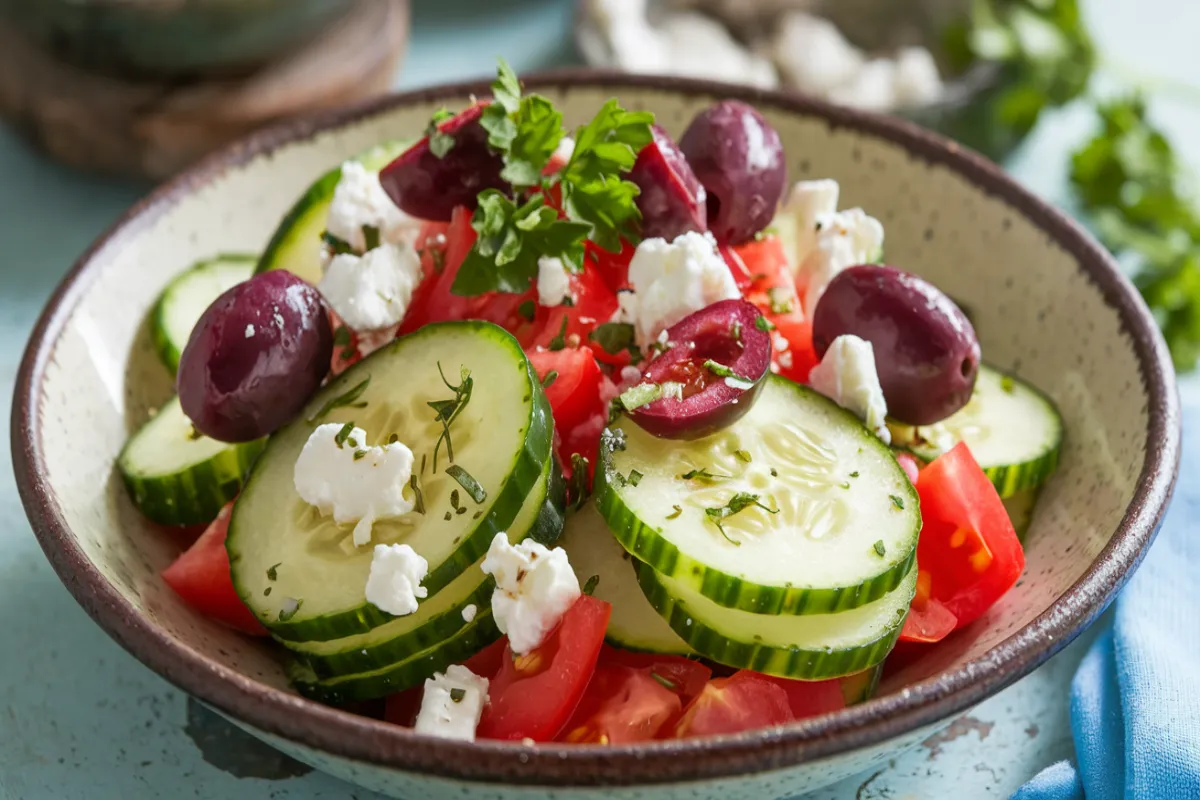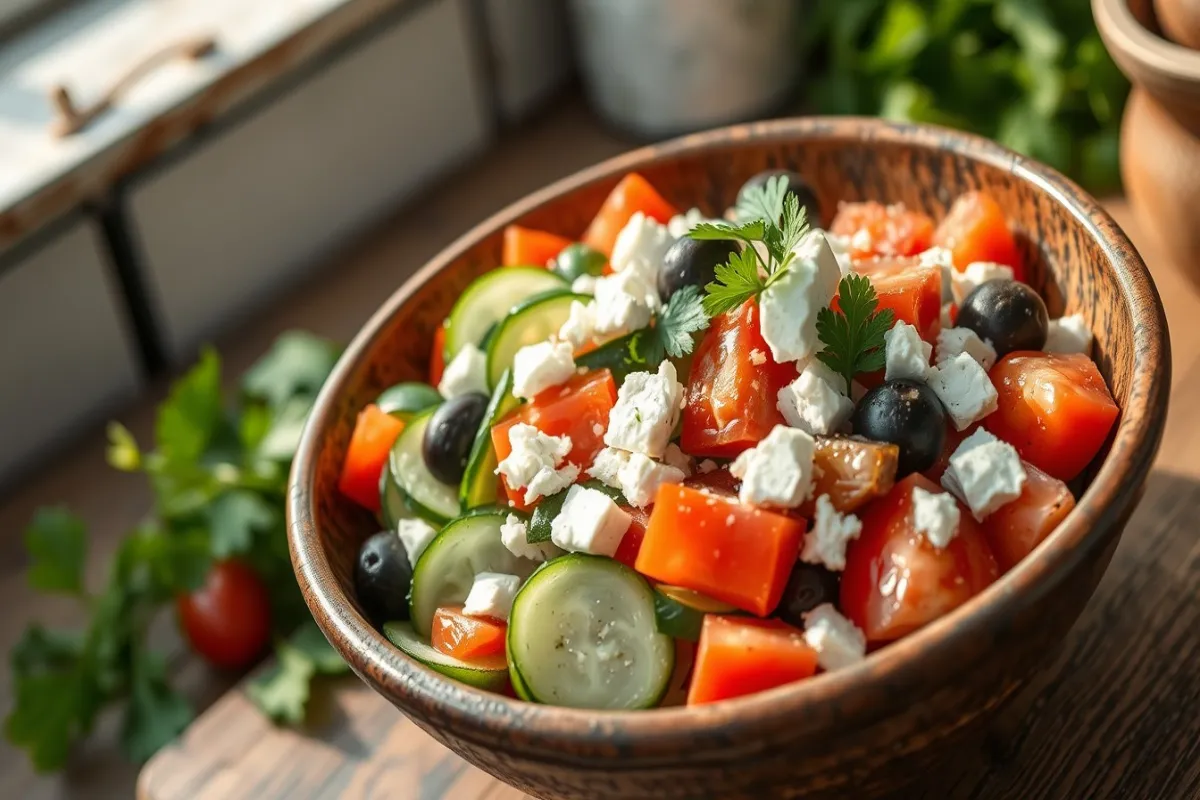Outline of the Article
- Introduction
- Brief Overview of Mediterranean Cucumber Salad
- Importance of Fresh Ingredients
- What is Mediterranean Cucumber Salad?
- Historical Background
- Key Ingredients
- Health Benefits of Mediterranean Cucumber Salad
- Nutritional Profile
- Benefits of Cucumber
- Health Benefits of Other Ingredients (Tomatoes, Olives, Feta, etc.)
- Ingredients Required
- Fresh Vegetables
- Herbs and Spices
- Cheese and Olives
- Step-by-Step Guide to Making Mediterranean Cucumber Salad
- Preparing the Cucumbers
- Chopping and Mixing Vegetables
- Adding Herbs and Dressing
- Final Assembly
- Variations of Mediterranean Cucumber Salad
- Adding Protein (Chicken, Tofu, etc.)
- Vegan and Dairy-Free Options
- Different Dressings
- Tips for the Best Mediterranean Cucumber Salad
- Choosing the Right Cucumbers
- Balancing Flavors
- Storage Tips
- Pairing Mediterranean Cucumber Salad with Other Dishes
- Perfect Pairings (Grilled Chicken Wrap, Corn on the Cob, etc.)
- Beverage Pairings
- Frequently Asked Questions (FAQs)
- How Long Can Mediterranean Cucumber Salad Be Stored?
- Can I Make Mediterranean Cucumber Salad Ahead of Time?
- What is the Best Way to Serve Mediterranean Cucumber Salad?
- Conclusion
- Summary of the Benefits and Versatility of Mediterranean Cucumber Salad
- Encouragement to Try Different Variations
Introduction
Mediterranean Cucumber Salad is not just another salad; it’s a celebration of fresh, vibrant, and healthy ingredients that epitomize the flavors of the Mediterranean region. This simple yet incredibly flavorful dish brings together crisp cucumbers, juicy tomatoes, tangy feta cheese, and briny olives, all tossed in a light dressing of olive oil and lemon juice. Whether you’re looking for a light side dish, a refreshing appetizer, or a healthy meal on its own, Mediterranean Cucumber Salad is a versatile choice that fits any occasion. In this comprehensive guide, we’ll dive into everything you need to know about this delightful salad, including its origins, health benefits, variations, and even pairing suggestions.
What is Mediterranean Cucumber Salad?
Historical Background
Mediterranean cuisine is renowned for its emphasis on fresh, wholesome ingredients, and this salad is a perfect representation of that culinary tradition. The Mediterranean diet, which is consistently ranked as one of the healthiest diets in the world, includes an abundance of fruits, vegetables, whole grains, and healthy fats, with a focus on moderation and balance. Mediterranean Cucumber Salad is believed to have its roots in Greek cuisine, where simple, fresh ingredients are often combined to create dishes that are both nutritious and flavorful.
The simplicity of Mediterranean Cucumber Salad reflects the broader philosophy of Mediterranean cooking—using what is fresh, available, and in season. The key components of the salad, including cucumbers, tomatoes, olives, and feta cheese, are staples in Mediterranean kitchens, particularly in Greece, Turkey, and surrounding regions. These ingredients have been cultivated in the Mediterranean climate for centuries, making them integral to the local diet.
Key Ingredients
The beauty of Mediterranean Cucumber Salad lies in its simplicity. Here’s a closer look at the ingredients that make this salad so special:
- Cucumbers: The star of the dish, cucumbers add a refreshing crunch and a mild flavor that pairs perfectly with the other ingredients. They are often used in Mediterranean salads because of their high water content, which makes them hydrating and cooling, especially in the hot summer months.
- Tomatoes: Ripe, juicy tomatoes add sweetness and acidity to the salad, balancing the creaminess of the feta cheese and the saltiness of the olives. Tomatoes are a staple in Mediterranean cooking and are used in everything from salads to sauces.
- Feta Cheese: This crumbly, tangy cheese is a signature ingredient in Greek cuisine. Made from sheep’s milk or a combination of sheep and goat’s milk, feta adds a creamy texture and a salty flavor that enhances the other ingredients.
- Olives: Olives are another quintessential Mediterranean ingredient. They add a rich, briny flavor to the salad and are packed with healthy fats and antioxidants. Kalamata olives are a popular choice for this salad, but other varieties can be used as well.
- Herbs: Fresh herbs like parsley, oregano, and mint add a burst of flavor and aroma to the salad. Herbs are used liberally in Mediterranean cooking to enhance the natural flavors of the ingredients.
- Olive Oil and Lemon Juice: These two ingredients form the base of the dressing, adding richness and acidity to the salad. Olive oil is a cornerstone of the Mediterranean diet, known for its heart-healthy properties.

Health Benefits of Mediterranean Cucumber Salad
Nutritional Profile
Mediterranean Cucumber Salad is not only delicious but also highly nutritious. Each ingredient contributes to the salad’s overall health benefits, making it a great choice for those looking to eat healthier. Here’s a breakdown of the nutritional benefits of the key ingredients:
- Cucumbers: Cucumbers are low in calories but high in water content, making them an excellent hydrating food. They are also a good source of vitamin K, which is important for bone health, and contain antioxidants that help protect the body from oxidative stress.
- Tomatoes: Tomatoes are rich in vitamins A and C, which support immune function and skin health. They also contain lycopene, an antioxidant that has been linked to reduced risk of heart disease and certain types of cancer.
- Feta Cheese: While feta cheese is higher in sodium than some other cheeses, it is also a good source of calcium and protein. These nutrients are essential for maintaining strong bones and muscles. Additionally, feta contains probiotics, which can support gut health.
- Olives: Olives are a source of healthy monounsaturated fats, which can help reduce the risk of heart disease. They also contain vitamin E, an antioxidant that supports skin health and may have anti-inflammatory effects.
- Olive Oil: Extra virgin olive oil is one of the healthiest fats you can consume. It is rich in monounsaturated fats and antioxidants, including vitamin E and polyphenols, which have been shown to reduce inflammation and lower the risk of chronic diseases like heart disease and cancer.
- Herbs: Fresh herbs are packed with vitamins, minerals, and antioxidants. For example, parsley is high in vitamins A, C, and K, and contains flavonoids that have been shown to have anti-inflammatory and immune-boosting effects.
Benefits of Cucumber
Cucumbers are one of the most hydrating vegetables you can eat, thanks to their high water content. This makes them particularly beneficial during hot weather when staying hydrated is essential. In addition to keeping you hydrated, cucumbers offer several other health benefits:
- Rich in Antioxidants: Cucumbers contain several antioxidants, including flavonoids and tannins, which prevent the accumulation of harmful free radicals in the body.
- Promotes Weight Loss: Cucumbers are low in calories and high in water, making them a perfect food for weight management. Their fiber content also helps you feel full, reducing the likelihood of overeating.
- Supports Healthy Skin: The antioxidants and hydration provided by cucumbers can help improve skin elasticity and reduce the appearance of wrinkles. The silica in cucumbers is also important for the strength and health of connective tissue.
Health Benefits of Other Ingredients
- Tomatoes: The lycopene in tomatoes has been extensively studied for its health benefits, particularly in reducing the risk of heart disease and prostate cancer. The vitamin C in tomatoes also boosts the immune system and promotes healthy skin.
- Olives: The healthy fats in olives support heart health by helping to reduce LDL (bad) cholesterol levels while maintaining HDL (good) cholesterol levels. The polyphenols in olives also have anti-inflammatory properties, which can reduce the risk of chronic diseases.
- Feta Cheese: In addition to being a good source of calcium and protein, feta cheese contains probiotics that can help support a healthy gut microbiome. These beneficial bacteria are important for digestion, immune function, and overall health.
Ingredients Required
To make the perfect Mediterranean Cucumber Salad, you’ll need the following ingredients:
Fresh Vegetables
- 2 large cucumbers, thinly sliced
- 4 medium tomatoes, chopped
- 1 red onion, thinly sliced
- 1 bell pepper, sliced (optional)
Herbs and Spices
- 1/4 cup fresh parsley, chopped
- 1 teaspoon dried oregano
- Freshly ground black pepper to taste
Cheese and Olives
- 1/2 cup feta cheese, crumbled
- 1/2 cup Kalamata olives, pitted and halved
Dressing
- 1/4 cup extra virgin olive oil
- 2 tablespoons fresh lemon juice
- Salt to taste
Step-by-Step Guide to Making Mediterranean Cucumber Salad
Preparing the Cucumbers
The first step in making a great Mediterranean Cucumber Salad is selecting the right cucumbers. Persian or English cucumbers are ideal because they have a thinner skin and fewer seeds, resulting in a more tender and less bitter salad. However, if you’re using regular cucumbers, you can peel them and remove the seeds to achieve a similar texture.
To prepare the cucumbers, wash them thoroughly and then slice them thinly. If you’re using a mandoline, you can achieve perfectly uniform slices, which not only looks appealing but also ensures even flavor distribution throughout the salad. Place the sliced cucumbers in a large mixing bowl.
Chopping and Mixing Vegetables
Next, prepare the tomatoes. If you’re using large tomatoes, cut them into bite-sized chunks. Cherry or grape tomatoes can be halved or quartered, depending on their size. Tomatoes add a juicy sweetness that complements the crisp cucumbers and balances the tanginess of the feta cheese.
Thinly slice the red onion and bell pepper, if using. Red onions are preferred for their milder flavor and vibrant color, but you can also use shallots if you prefer a more delicate onion flavor. The bell pepper adds a subtle sweetness and a pop of color to the salad.
Add the chopped tomatoes, red onion, and bell pepper to the bowl with the cucumbers. Gently toss the vegetables together to combine.
Adding Herbs and Dressing
Fresh herbs are what elevate this salad from simple to extraordinary. Chop the parsley finely and add it to the bowl along with the dried oregano. If you want to add a more aromatic twist, consider adding a few leaves of fresh mint or basil. These herbs not only add flavor but also enhance the visual appeal of the salad.
In a small bowl, whisk together the olive oil, lemon juice, salt, and pepper. The dressing should be light and fresh, allowing the flavors of the vegetables and herbs to shine through. Pour the dressing over the salad and toss gently to ensure that all the ingredients are evenly coated.
Final Assembly
The final step is to add the crumbled feta cheese and halved olives to the salad. Feta cheese adds a creamy, tangy contrast to the crunchy vegetables, while the olives provide a rich, briny flavor. If you prefer a less salty salad, you can rinse the olives before adding them.
Give the salad one last gentle toss to combine all the ingredients. Taste and adjust the seasoning if necessary. You can add more lemon juice, olive oil, or salt to suit your preferences. Your Mediterranean Cucumber Salad is now ready to serve!
Variations of Mediterranean Cucumber Salad
One of the best things about Mediterranean Cucumber Salad is its versatility. You can easily customize the salad to suit your tastes or dietary preferences. Here are some popular variations:
Adding Protein
To make the salad more filling, consider adding a source of protein. Grilled chicken is an excellent choice and pairs beautifully with the flavors of the salad. You can also add tofu for a vegetarian option. The grilled chicken from this Grilled Chicken Wrap recipe would be a perfect addition.
- Grilled Chicken: Marinate the chicken in olive oil, lemon juice, garlic, and herbs before grilling. Slice the cooked chicken and add it to the salad for a more substantial meal.
- Tofu: For a vegetarian or vegan option, use firm tofu. Press the tofu to remove excess moisture, then marinate it in a mixture of soy sauce, olive oil, and garlic before grilling or pan-frying. Tofu adds protein without altering the salad’s fresh, light taste.

Vegan and Dairy-Free Options
For those who are vegan or dairy-intolerant, you can still enjoy Mediterranean Cucumber Salad by making a few simple substitutions.
- Vegan Feta: There are several vegan feta cheese options available that mimic the texture and flavor of traditional feta. You can find them in most grocery stores or make your own using tofu, nutritional yeast, lemon juice, and herbs.
- Extra Olives: To maintain the salad’s briny flavor without using cheese, add extra olives or capers. These ingredients provide the same salty, umami taste that feta brings to the salad.
Different Dressings
While the classic olive oil and lemon juice dressing is a favorite, there are plenty of other dressings you can try to change up the flavor profile of the salad.
- Yogurt Dressing: Mix Greek yogurt with lemon juice, garlic, and dill for a creamy, tangy dressing that adds a new dimension to the salad.
- Balsamic Vinaigrette: A balsamic vinaigrette can introduce a sweet and tangy flavor that pairs well with the freshness of the vegetables.
- Tahini Dressing: Tahini, a sesame seed paste, can be blended with lemon juice, garlic, and water to create a rich, nutty dressing that complements the Mediterranean flavors.
Tips for the Best Mediterranean Cucumber Salad
To ensure that your Mediterranean Cucumber Salad is as delicious as possible, follow these tips:
Choosing the Right Cucumbers
The type of cucumber you use can significantly impact the texture and flavor of the salad. Persian and English cucumbers are preferred because they have thinner skin and fewer seeds. This makes them less bitter and more tender. If you’re using regular cucumbers, peel them and scoop out the seeds to improve their texture.
Balancing Flavors
The key to a great Mediterranean Cucumber Salad is balancing the flavors. The salad should have the perfect mix of salty, tangy, and sweet elements. If you find that the salad tastes a bit flat, here are a few adjustments you can make:
- More Lemon Juice: Adding more lemon juice can brighten the flavors and enhance the freshness of the salad.
- Additional Salt: If the feta and olives aren’t providing enough saltiness, add a pinch of salt to bring out the flavors.
- Extra Herbs: Adding more fresh herbs, such as parsley, mint, or dill, can elevate the taste and aroma of the salad.
Storage Tips
Mediterranean Cucumber Salad is best enjoyed fresh, but it can be stored in the refrigerator for up to two days. Here are some tips for storing the salad:
- Use an Airtight Container: To keep the salad fresh, store it in an airtight container in the refrigerator.
- Add Dressing Before Serving: If you’re making the salad ahead of time, consider storing the dressing separately and adding it just before serving. This will prevent the salad from becoming soggy.
- Reviving Leftovers: If the salad has been stored for a day or two, you can revive it by adding a little more lemon juice or olive oil before serving.
Pairing Mediterranean Cucumber Salad with Other Dishes
Mediterranean Cucumber Salad is incredibly versatile and pairs well with a variety of dishes. Here are some ideas for pairing the salad with other foods:
Perfect Pairings
- Grilled Chicken Wrap: The light and fresh flavors of the salad complement the savory taste of a Grilled Chicken Wrap. The salad can be served as a side dish or even inside the wrap for added crunch and flavor.
- Corn on the Cob: Serve the salad alongside Grilled Corn on the Cob for a delightful summer meal. The freshness of the salad contrasts nicely with the smoky sweetness of grilled corn.
- Teriyaki Chicken: The salad’s crispness and acidity can balance the rich, savory flavors of Grilled Teriyaki Chicken. The combination of these dishes makes for a well-rounded meal that’s both satisfying and healthy.
Beverage Pairings
- Sparkling Water: For a non-alcoholic option, try sparkling water with a splash of lemon or lime. The bubbles and citrus will enhance the freshness of the salad.
- Herbal Iced Tea: A glass of iced herbal tea, such as mint or chamomile, can complement the salad’s light and refreshing qualities.
Frequently Asked Questions (FAQs)
How Long Can Mediterranean Cucumber Salad Be Stored?
Mediterranean Cucumber Salad can be stored in the refrigerator for up to two days. For the best texture and flavor, it’s recommended to consume it fresh. If you need to store it, keep it in an airtight container, and consider adding the feta cheese and dressing just before serving.
Can I Make Mediterranean Cucumber Salad Ahead of Time?
Yes, you can prepare Mediterranean Cucumber Salad a few hours in advance. If you’re making it ahead of time, store the dressing separately and mix it in just before serving to keep the vegetables crisp. This method also helps the flavors meld together without the salad becoming soggy.
What is the Best Way to Serve Mediterranean Cucumber Salad?
Serve Mediterranean Cucumber Salad chilled as a side dish, appetizer, or light main course. It pairs well with grilled meats, such as chicken or fish, and other Mediterranean dishes like hummus, pita bread, or roasted vegetables.
Can I Customize Mediterranean Cucumber Salad?
Absolutely! Mediterranean Cucumber Salad is highly customizable. You can add protein, such as grilled chicken or tofu, switch up the dressing, or incorporate additional vegetables like bell peppers or avocados. You can also experiment with different herbs to suit your taste preferences.
Is Mediterranean Cucumber Salad Gluten-Free?
Yes, Mediterranean Cucumber Salad is naturally gluten-free, making it a great option for those with gluten sensitivities or celiac disease. Just be sure to use gluten-free feta cheese if needed, as some processed cheeses can contain gluten.
Conclusion
Mediterranean Cucumber Salad is more than just a salad; it’s a versatile, healthy, and delicious dish that can be enjoyed in countless ways. Whether you’re serving it as a light side dish at a summer barbecue or making it the centerpiece of a healthy meal, this salad is sure to impress. With its fresh, vibrant flavors and simple preparation, Mediterranean Cucumber Salad is a recipe that you’ll want to make again and again. So why not try it today? Get creative with your ingredients, experiment with different variations, and enjoy the refreshing taste of the Mediterranean in every bite.

